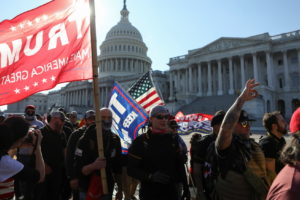Stanford’s Robert Weisberg on Longtime Trump Advisor Steve Bannon’s Contempt of Congress Sentence
Stephen Bannon, chief executive officer of former president Trump’s 2016 presidential campaign who went on to serve as chief strategist and senior counselor to the president following that election, was found guilty of two counts of contempt of Congress for defying a subpoena from the House January 6 committee. Here, Stanford Law’s criminal justice law expert Robert Weisberg discusses the charges and the sentence.

First, can you explain the charges against Steve Bannon?
He was convicted in a jury trial for flatly refusing to even respond to a subpoena from the House January 6 Committee. The Committee sought his testimony and documents regarding his and Donald Trump’s role in the attack on the Capitol.
What’s the relevant law here?
Congress has three ways of addressing contempt. The first is “civil” contempt through a lawsuit in a court. This could still involve jail, but it would operate like a court order meaning that Bannon would remain in jail unless and until he complies—then he could get out of jail, and he wouldn’t have a criminal record. Congress rarely uses this, but the analogous use by trial judges is common.
The second is Congress’s “inherent power “of contempt. Congress on its own would charge, try, and jail him, but again he could end his incarceration by complying. This power has an old and legitimate provenance but is rarely used.
And third is criminal citation for contempt, whereby Congress refers the case to a federal prosecutor, who can then charge the person via a grand jury and then try him for a misdemeanor carrying a sentence of up to a year in jail.
In the Bannon case, Congress used this last method.

How strong was the evidence?
Nuclear strong. His refusal was overt and loud. In theory Bannon could have defended himself by showing up in Congress and stating publicly that, say, he was invoking the privilege against self-incrimination or attorney-client privilege. Bannon did proclaim to the world that he had Executive Privilege. Alas for him, he had stopped working for the White House in 2017. (At one point Bannon did offer the feckless argument that he believed deadlines to respond to the committee were just starting points for negotiation.)
What do you think of the sentence? Was it fair?
For such a blatant and obviously legally groundless refusal, who could argue that 4 months was too harsh? But he could rightly point out that Congress has very rarely used this power and not in a very long time. So, to avoid the insinuation of political motive, Congress and the prosecutor would have to argue that this was an egregious case, and one at a time when the need to ensure compliance with the law had taken on existential significance for the nation.
What are the larger implications of the sentence? Particularly in this politically polarized climate?
It probably cuts both ways. The threat of similar punishment might cause other recalcitrant Trump allies to comply. (Even if the January 6 committee is done, there may be other proceedings in other tribunals soon.) But given Bannon’s purported role as an idealistic civil disobedient (John Peter Zenger?), the conviction is an inspiring Maga-moment.
Robert Weisberg is the Edwin E. Huddleson, Jr. Professor of Law and Faculty Co-Director of the Stanford Criminal Justice Center. His scholarship focuses on criminal law, criminal procedure, white collar crime, and sentencing policy.
